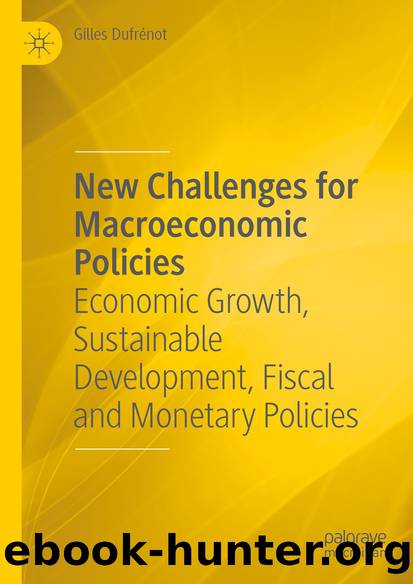New Challenges for Macroeconomic Policies: Economic Growth, Sustainable Development, Fiscal and Monetary Policies by Gilles Dufrénot

Author:Gilles Dufrénot
Language: eng
Format: epub
ISBN: 9783031157547
Publisher: Springer International Publishing
Fig. 5.11Profit share in selected European countries. Source: Eurostat
5.3 Financial Market Developments and Macroeconomics
A major fact of the last quarter of the twentieth century was the liberalization and globalization of financial markets from the mid-1980s onward. This changed the individual agentsâ behaviors in accessing financing for their activities and had major repercussions on the economiesâ real sector. Private and public debts have grown, wealth and balance sheet effects have become important following the greater financial volatility that amplified the rise and fall of stock and real estate prices. While during the years of Great Moderation, macroeconomists had focused their attention on the determinants of the business cycle, they finally came to the conclusion that financial cycles have amplitude and duration greater than those of the business cycle. They can therefore generate large-scale imbalances that can affect economic variables for very long time periods. Faced with this phenomenon, macroeconomists needed to think about new ways of analyzing macroeconomics in the twenty-first century.
The first important feature is that finance is not neutral for the real economy. It has strong effects on the real variables in both the short and long terms. The economistâs job is to explain the determination of not only relative prices but also nominal (financial) prices.
A second feature is that the well-known maxim of the French chemist philosopher (and economist!) Lavoisier also applies to an economy: ânothing is lost, nothing is created, everything is transformed.â If we have been deploring the apparent disappearance of inflation for at least two decades in the real economy, this phenomenon says nothing about the effectiveness of restrictive monetary policies, but it does indicate that inflation has moved from the real sector to the financial sector: very regularly for the past 30 years, financial asset prices have been experiencing bubbles.
A third implication of the development of finance is that spontaneous equilibria in any economy must be seen as an exception. The economic cycle is not only caused by exogenous shocks. It is also caused by a financial cycle resulting from permanent endogenous imbalances related to the functioning of financial markets. As a result, cyclical fluctuations can no longer be explained by the theory of real business cycles (or DSGE models without a financial sector). When they make optimal choices, households and firms do not only decide on the number of hours worked, their demand or supply of labor, or their consumption. They must also decide in what form to accumulate their wealth. They are not always free to decide how much they save, or how much they dis-save because of the imperfections of financial markets. The role of the constraints that hinge on financial intermediaries has become crucial.
Fourth, finance can thwart the recovery of economies when it triggers the following vicious circle. During financial euphoria (Minsky moment), private debt is run up, the value of collateral and net assets on the balance sheets of companies and households increase, and production is sustained by financial bubbles. When the cycle turns around, over-indebtedness appears, balance sheets weaken and consumption falls, causing output to fall.
Download
This site does not store any files on its server. We only index and link to content provided by other sites. Please contact the content providers to delete copyright contents if any and email us, we'll remove relevant links or contents immediately.
International Integration of the Brazilian Economy by Elias C. Grivoyannis(111059)
The Radium Girls by Kate Moore(12028)
Turbulence by E. J. Noyes(8049)
Nudge - Improving Decisions about Health, Wealth, and Happiness by Thaler Sunstein(7706)
The Black Swan by Nassim Nicholas Taleb(7129)
Rich Dad Poor Dad by Robert T. Kiyosaki(6632)
Pioneering Portfolio Management by David F. Swensen(6300)
Man-made Catastrophes and Risk Information Concealment by Dmitry Chernov & Didier Sornette(6019)
Zero to One by Peter Thiel(5802)
Secrecy World by Jake Bernstein(4753)
Millionaire: The Philanderer, Gambler, and Duelist Who Invented Modern Finance by Janet Gleeson(4478)
The Age of Surveillance Capitalism by Shoshana Zuboff(4292)
Skin in the Game by Nassim Nicholas Taleb(4248)
The Money Culture by Michael Lewis(4207)
Bullshit Jobs by David Graeber(4190)
Skin in the Game: Hidden Asymmetries in Daily Life by Nassim Nicholas Taleb(4007)
The Dhandho Investor by Mohnish Pabrai(3765)
The Wisdom of Finance by Mihir Desai(3747)
Blockchain Basics by Daniel Drescher(3583)
